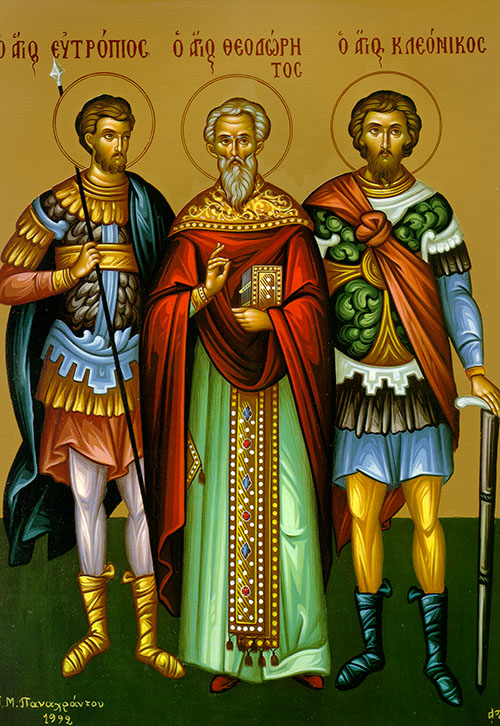

The Holy martyrs Eutropius, Cleonicus and Basiliscus suffered in the city of Pontine Amasea (Asia Minor) in about the year 308. The brothers Eutropius and Cleonicus, and Basiliscus the nephew of the Great Martyr Theodore the Recruit, were comrades. After the martyric death of St. Theodore, they wound up in prison and by their preaching brought many of the pagans in prison with them to the Christian Faith. Saints Eutropius, Cleonicus, and Basiliscus were brought before the governor Asclepiodotus, they firmly confessed their faith in Christ before him. They were mercilessly beaten, so that their bodies were entirely bruised. On the morning of March 3, Saints Eutropius and Cleonicus were crucified, but Basiliscus was left in prison. St. Basiliscus was executed on May 22 in the city of Komana. They beheaded him and threw his body into a river, but Christian followers found his relics and buried them in a plowed field. Later at Komana a church was built and dedicated to St. Basiliscus.
O Lord our God, your holy martyrs have deserved the crown of immortality on account of their good fight. Armed with your strength, they have vanquished their persecutors and crushed Satan’s dreadful might. Through their supplications, O Christ our God, save our souls.
This trinity of martyrs confessed the Holy Trinity before many nations. Undergoing their suffering of martyrdom, they have been presented to the angels. Today we are honoring them, celebrating their sacred and life-saving memory.
Hebrews 4:14 – 5:6
Brothers and sisters: Since, then, we have a great high priest who has passed through the heavens, Jesus, the Son of God, let us hold fast to our profession of faith. For we do not have a high priest who is unable to sympathize with our weakness, but one who was tempted every way that we are, yet never sinned. So let us confidently approach the throne of grace to receive mercy and favor and to find help in time of need.
Every high priest is taken from among men and made their representative before God, to offer gifts and sacrifices for sins. He is able to deal patiently with erring sinners, for he himself is beset by weakness and must make sin offerings for himself as well as for the people. One does not take this honor on his own initiative, but only when called by God as Aaron was. Even Christ did not glorify himself with the office of high priest; he received it from the One who said to him, “You are my son; today I have begotten you”; just as he says in another place, “You are a priest forever, according to the order of Melchizedek.”
Mark 8:34 – 9:1
At that time Jesus summoned the crowd with his disciples and said to them: “If a man wishes to come after me, he must deny his very self, take up his cross, and follow in my steps. Whoever would preserve his life will lose it, but whoever loses his life for my sake and the gospel’s sake will preserve it. What prophet does a man show who gains the whole world and destroys himself in the process? What can a man offer in exchange for his life? If anyone in this faithless and corrupt age is ashamed of me and my doctrine, the Son of Man will be ashamed of him when he comes with the holy angels in his Father’s glory.” He also said to them: “I assure you, among those standing here there are some who will not taste death until they see the reign of God established in power.”
Icon courtesy of Jack Figel, Eastern Christian Publications – ecpubs.com
Saturday, March 2 –